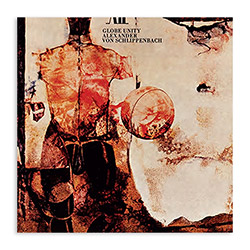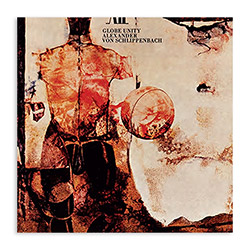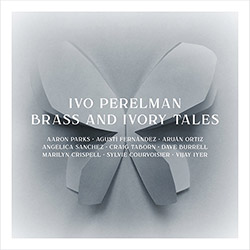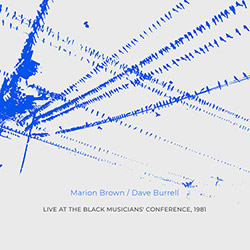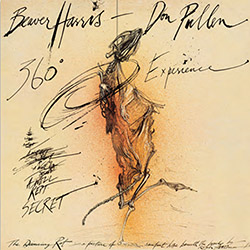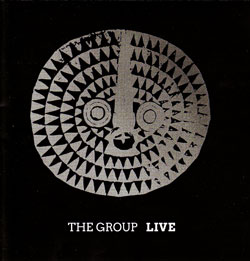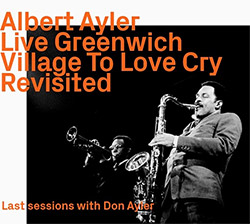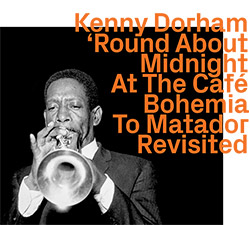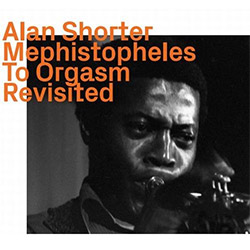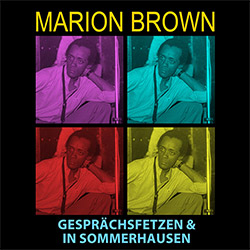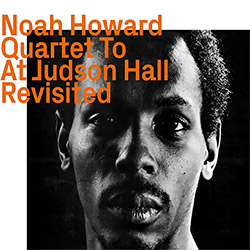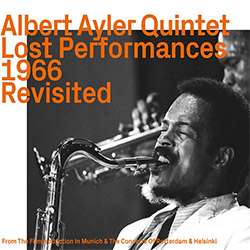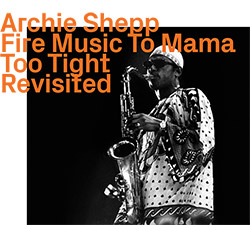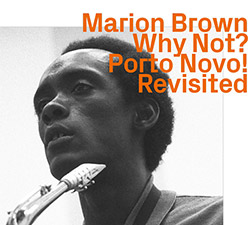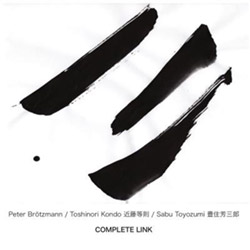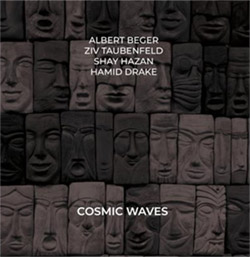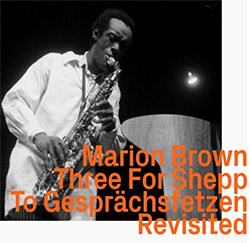
Remastering and restoring Marion Brown's 1967 Impulse! album with Grachan Moncure III, Dave Burrel, Stanley Cowell, Sirone, Beaver Harris & Bobby Capp, and his 1968 album on the Calig label with Gunter Hampel, Steve McCall, Ambrosa Jackson & Buschi Niedergall; two albums of essential "New Thing" work through fascinating composed forms by Brown, plus Archie Shepps' "Delicado"; essential.
In Stock
Quantity in Basket: None
Log In to use our Wish List
Shipping Weight: 2.00 units
Sample The Album:
Marion Brown-alto saxophone
Grachan Moncur III-trombone
Dave Burrell-piano
Stanley Cowell-piano
Sirone-(aka Norris Jones) double bass
Bobby Kapp-drums
Beaver Harris-drums
Marion Brown-alto saxophone
Ambrose Jackson-trumpet
Gunter Hampel-vibraphone, bass clarinet
Buschi Niebergall-double bass
Steve McCall-drums
Click an artist name above to see in-stock items for that artist.
UPC: 752156117025
Label: ezz-thetics by Hat Hut Records Ltd
Catalog ID: ezz-thetics 1170
Squidco Product Code: 34603
Format: CD
Condition: New
Released: 2024
Country: Switzerland
Packaging: Cardboard Gatefold
Tracks 1 to 6 recorded at Van Gelder Studio, in Englewood Cliffs, New Jersey, on December 1st 1966.
Track 7 to 11 recorded at Modernes Theater Munchen, in Munich, Germany, on September 20th, 1968.
Three For Shepp originally released in 1967 as a vinyl LP on the Impluse! label with catalog code AS-9139. Gesprächsfetzen originally released in 1968 as a vinyl LP on the Calig label with catalog code CAL 30 601.
"It is often those we hear the least that we should listen to the most." So wrote the Guadeloupean pianist Jonathan Jurion on the release of his album Le Temps Fou: The Music Of Marion Brown.
Just why Marion Brown has become such a rarely acknowledged figure is unclear. He possessed all the qualifications needed to go large plus a few extras for good measure. He was a good-looking man. He dressed well (telling Dave Burrell "to play pretty you have to look pretty"). He had a nice line in media-friendly aphorisms generally (saying of Ascension "you could use this record to heat up your apartment on a cold morning"}. The camera liked him. So by all accounts did women. He released fifteen well-received albums as leader during his first decade on record (two on ESP-Disk, four on Impulse!, one on ECM, an impressive threesome) and carried on recording frequently into the mid 1990s, when ill-health began to take its toll.
Most importantly, though he was adept at free improvisation, Brown was also at home with consonance, structured composition and modal and melodic forms of improvisation. Even at his most abrasively intense, he was never more "difficult" than, say, his brothers in arms Albert Ayler and Cecil Taylor, whose names are recognised by uncounted numbers of people who have never actually heard their music, only the shrill cries of their detractors. So why is Brown so often left out of the post-Coltrane pantheon and feted only by connoisseurs? *
The reason for Brown's neglect is perhaps because in a complicated world people crave simplicity, demarcations and straight lines. While there is nothing forbiddingly complex about Brown's legacy, its rainbow nature resists the easy categorisation so beloved of critics. Brown saw no contradiction between feeding the fires on Ascension and taking the starring role on his friend Harold Budd's glacially serene song-cycle The Pavilion Of Dreams.
Brown's own work, too, was unfettered and diverse. On albums such as Three For Shepp, for instance, he mixed bravura free improvisation with elegant balladry; on the triptych Afternoon Of A Georgia Faun / Geechee Recollections / Sweet Earth Flying he explored west African and southern US folk forms to create an ethno-musicological autobiography the like of which we would not hear again until Matana Roberts' Coin Coin series (which by cosmic coincidence Roberts began recording the year Brown passed); on Vista and Reeds 'N Vibes, co-led with Gunter Hampel, he explored textural and borderline-ambient territories. The list goes on. No straight lines anywhere.
More than this, unlike his contemporary Pharoah Sanders, who also moved on from his shock 'n' awe calling card, Brown did not replace one stylistic approach with a new one, reinventing himself in the process. Instead he added each new paradigm to the existing ones. His style did not so much change as accumulate. No doubt if Brown had emerged in the 21st century, a darkside record label would have advised him to keep his brand identity one-dimensional.
Brown was already defying categorisation in 1966 when he recorded Three For Shepp, whose six tracks open Three For Shepp To Gespächsfetzen Revisited. Brown's opening "New Blues" and Shepp's closing "Delicado," though compelling, are relatively orthodox expressions of mid 1960s New Thing. The four tracks they book-end, however, are distinctive even today. Brown's exquisite "Fortunato," though it sounds like nothing Pharoah Sanders ever wrote, inhabits similarly pretty terrain as Sanders' astral-jazz manifesto Tauhid's "Upper Egypt & Lower Egypt" and "Japan." Of the Shepp tunes, "West India," with its Caribbean flourishes and calypsonian alto solo, is a first taste of what would become an ongoing strand in Brown's music.
Multi-instrumentalist Gunter Hampel - billed as co-leader with Brown on the 1968 edition of Gespächsfetzen - is another wayward one-off who deserves to be listened to more often. His 1965 album Heartplants was among the earliest fully realised recordings of European free jazz and in 1966 he was among the first European musicians to notch up a release on ESP-Disk. In 1968, in Paris, he played on Brown's Le Temps Fou. The same month, in Munich, the pair recorded Gespächsfetzen (which translates as "a scrap of conversation"). Brown's abandoned solo on the title track and proto-skronk romp on "Exhibit A" are among the highlights and Hampel's textural inventions, on vibraphone and bass clarinet, are a joy throughout.
Brown and Hampel titled what would be their final album Gemini because by 1993 they regarded themselves as twins, despite the ethno-cultural differences which could have divided them. Explained Hampel in a recent interview: "Jazz exists in this world so that things become clear."-Chris May, London, February 2024
* One place where Brown is more than a footnote in history is the ezz-thetics community. Three For Shepp To Gespächsfetzen Revisited joins the label's previously released sonic upgrades Capricorn Moon To Juba Lee Revisited and Why Not? Porto Novo! Revisited.
Artist Biographies
• Show Bio for Marion Brown "Marion Brown (September 8, 1931 - October 18, 2010) was an American jazz alto saxophonist and ethnomusicologist. He is most well known as a member of the 1960s avant-garde jazz scene in New York City, playing alongside musicians such as John Coltrane, Archie Shepp, and John Tchicai. He performed on Coltrane's landmark 1965 album Ascension. Brown was born in Atlanta, in 1931. He joined the Army in 1953 and in 1956 went to Clark College to study music. In 1960 Brown left Atlanta and studied pre-law at Howard University for two years. He moved in 1962 to New York, where he befriended poet Amiri Baraka and musicians including Ornette Coleman, Archie Shepp, Sun Ra, Pharoah Sanders, Paul Bley, Clifford Thornton, and Rashied Ali. He appeared on several important albums from this period, such as Shepp's Fire Music and Attica Blues, but most notably John Coltrane's Ascension. In 1967, Brown travelled to Paris, where he developed an interest in architecture, Impressionistic art, African music and the music of Erik Satie. In the late 1960s, he was an American Fellow in Music Composition and Performance at the Cité Internationale des Arts in Paris. Around 1970, he provided the soundtrack for Marcel Camus' film Le temps fou, a soundtrack featuring Steve McCall, Barre Phillips, Ambrose Jackson and Gunter Hampel. Brown returned to the US in 1970, where he felt a newfound sense of creative drive. He moved to New Haven, Connecticut, to serve as a resource teacher in a child study center in the city's public school system until 1971. He composed and performed incidental music for a Georg Büchner play, Woyzeck. In 1971, Brown was an assistant professor of music at Bowdoin College in Brunswick, Maine, a position he held until he attained his Bachelor's degree in 1974. In addition to this role, he held faculty positions at Brandeis University (1971-74), Colby College (1973-74), and Amherst College (1974-75), as well as a graduate assistant position at Wesleyan University (1974-76). Brown earned a Master's degree in ethnomusicology from Wesleyan in 1976. His master's thesis was entitled "Faces and Places: The Music and Travels of a Contemporary Jazz Musician". Throughout his tenure as an educator, Brown continued to compose, perform and record. Notable recordings during this period included Afternoon of a Georgia Faun for the ECM label in 1970 and three albums for the Impulse! label between 1973 and 1975. He played alto saxophone on the composition "Bismillahi 'Rrahman 'Rrahim" from Harold Budd's 1976 release The Pavilion of Dreams, a piece originally written by Budd for Brown's Vista LP, released the previous year. In 1972 and 1976, Brown received grants from the National Endowment for the Arts, which he used to compose and publish several pieces for solo piano, one of which was based on the poetry of Jean Toomer in his book Cane. He also transcribed some piano and organ music by Erik Satie including his Messe des pauvres and Pages mysterieuses, and arranged the composer's Le Fils des étoiles for two guitars and violin. In 1981, Brown began focusing on drawing and painting. His charcoal portrait of blues guitarist Blind Lemon Jefferson was included in a New York City Kenkeleba Gallery art show called Jus' Jass, which also included works by artists such as Romare Bearden, Charles Searles and Joe Overstreet. By the 2000s, Brown had fallen ill; due to a series of surgeries and a partial leg amputation, Brown resided for a time in a nursing home in New York. By 2005 he had moved to an assisted living facility in Hollywood, Florida, where he died in 2010, aged 79." ^ Hide Bio for Marion Brown • Show Bio for Grachan Moncur III "Grachan Moncur III (born June 3, 1937) is an American jazz trombonist. He is the son of jazz bassist Grachan Moncur II and the nephew of jazz saxophonist Al Cooper. Born in New York City (his father's father was from the Bahamas) and raised in Newark, New Jersey, Grachan Moncur III began playing the cello at the age of nine, and switched to the trombone when he was 11. In high school he attended the Laurinburg Institute in North Carolina, the private school where Dizzy Gillespie had studied. While still at school he began sitting in with touring jazz musicians on their way through town, including Art Blakey and Jackie McLean, with whom he formed a lasting friendship. After high school Moncur toured with Ray Charles (1959–62), Art Farmer and Benny Golson's Jazztet (1962), and Sonny Rollins. He took part in two classic Jackie McLean albums in the early 1960s, One Step Beyond and Destination... Out!, to which he also contributed the bulk of compositions and which led to two influential albums of his own for Blue Note Records, Evolution (1963) with Jackie McLean and Lee Morgan, and Some Other Stuff (1964) with Herbie Hancock and Wayne Shorter. Moncur joined Archie Shepp's ensemble and recorded with other avant-garde players such as Marion Brown, Beaver Harris and Roswell Rudd (the other big name in American free jazz trombone). During a stay in Paris in the summer of 1969, he recorded two albums as a leader for the famous BYG Actuel label, New Africa and Aco Dei de Madrugada, as well as appearing as a sideman on numerous other releases of the label. In 1974, the Jazz Composer's Orchestra commissioned him to write Echoes of Prayer (1974), a jazz symphony featuring a full orchestra plus vocalists and jazz soloists. His sixth album as a leader, Shadows (1977) was released only in Japan. Unfortunately, he was subsequently plagued by health problems and copyright disputes and recorded only rarely. Through the 1980s he recorded with Cassandra Wilson (1985), played occasionally with the Paris Reunion Band and Frank Lowe, appeared on John Patton's Soul Connection (1983), but mostly concentrated on teaching. In 2004 he re-emerged with a new album (Exploration) on Capri Records featuring Grachan's compositions arranged by Mark Masters for an octet including Tim Hagans and Gary Bartz." ^ Hide Bio for Grachan Moncur III • Show Bio for Dave Burrell "Distinguished composer-pianist Dave Burrell is an African-American performing artist of singular stature on the international contemporary music scene. His dynamic compositions with blues and gospel roots recall the tradition of Jelly Roll Morton, James P. Johnson and Duke Ellington, as well avant garde composers Thelonious Monk and John Coltrane. Dave and his parents moved from New York to Hawaii in 1946. After majoring in music at the University of Hawaii, he enrolled at Berklee College of Music in Boston, Massachusetts graduating with degrees in composition/arranging and performance in 1965. He moved to New York City, where he quickly established himself as one of the most innovative and original pianists, collaborating with the emerging leaders in contemporary jazz, joining the groups of saxophonists Marion Brown, Pharoah Sanders and Archie Shepp. [...] Dave Burrell has 40 recordings under his own name, among them High, High Two, Echo, La Vie de Boheme, After Love, In-Sanity, Only Me, Dreams, Black Spring, Lush Life, 'Round Midnight, Teardrops for Jimmy, Windward Passages, Daybreak, Brother to Brother, In Concert, Jelly Roll Joys, Esquisses for a Walk, Live at Caramoor, Changes and Chances, Recital, Expansion, Margy Pargy, Momentum, Dave Burrell Plays His Songs, No Fools No Fun, Dave Burrell Conception. Dave Burrell appears on 130 recordings, among them his pivotal recordings with tenor saxophonists Archie Shepp: Live from Pan-African Festival, There is a Trumpet in MySoul, Blasé, Kwanza, Attica Blues, Cry of My People, Montreaux One, Montreaux Two, Lover Man, Pharoah Sanders: Tauhid, Marion Brown: Jubalee, Three For Shepp, Live in Japan, David Murray: Hope Scope, Lovers, Deep River, Ballads, Spirituals, Remembrances, Lucky Four, Picasso, Windward Passages. Other important recordings are 360 Degree Music Experience: From Ragtime to No Time, In:sanity, Grachan Moncur: New Africa, Sunny Murray: Homage to Africa, Bob Stewart: Here and Now, and Consequences with drummer Billy Martin. The Inside Songs of Curtis Mayfield and Essence of Ellington with William Parker's Ensembles. Horo Records in Italy recently released a live duo recording, No Fools No Fun with Ellington-drummer Sam Woodyard from a 2 months long engagement in Paris (1979). Dave Burrell appears on the Argentine saxophonist Roberto Pettinato's Sony/Columbia Argentina Records releases Purity and Same Egg. A live duo recording with guitarist Garrison Fewell, New Earth to be released in 2015. A frequent lecturer, Burrell's Master Classes include Strasbourg Conservatory, Tremblay Conservatory (Paris), Conservatoire Municipal (Paris), Guildhall School of Music and Dance (London), Columbia University, New York University, Queens College, Bard College, New York. University of Pennsylvania, Swarthmore College, Bryn Mawr College, Duquesne University, School of Music, Pennsylvania. Brandeis University, Massachusetts. Rice University, Houston, Texas. DePauw University, Indiana. Library of Congress and Kennedy Center, Washington, D.C. Burrell's most recent commissions include Rosenbach Museum and Library, Philadelphia, and Whitney Museum, New York City. Dave Burrell is the recipient of numerous grants and awards including National Endowment for the Arts, Philadelphia Music Foundation, William J. Cooper Foundation, New York State Council on the Arts, Pennsylvania State Council on The Arts, MidAtlantic Foundation, John Garcia Gensel Award, and the Pew Fellowship in Jazz Composition. Dave Burrell joined the Steinway Artist Roster (www.Steinway.com) in 2007." ^ Hide Bio for Dave Burrell • Show Bio for Stanley Cowell "Stanley Cowell (born May 5, 1941) is an American jazz pianist and co-founder of the Strata-East Records label. Cowell played with Marion Brown, Max Roach, Bobby Hutcherson, Clifford Jordan, Harold Land, Sonny Rollins and Stan Getz. Cowell played with trumpeter Charles Moore and others in the Detroit Artist's Workshop Jazz Ensemble in 1965–66. During the late 1980s Cowell was part of a regular quartet led by J.J. Johnson. Cowell taught in the Music Department of the Mason Gross School of the Arts at Rutgers, the State University of New Jersey. Cowell played with Marion Brown, Max Roach, Bobby Hutcherson, Clifford Jordan, Harold Land, Sonny Rollins and Stan Getz. Cowell played with trumpeter Charles Moore and others in the Detroit Artist's Workshop Jazz Ensemble in 1965–66. During the late 1980s Cowell was part of a regular quartet led by J.J. Johnson. Cowell taught in the Music Department of the Mason Gross School of the Arts at Rutgers, the State University of New Jersey." ^ Hide Bio for Stanley Cowell • Show Bio for Sirone "Norris Jones, better known as Sirone (September 28, 1940 – October 21, 2009) was an American jazz bassist and composer. Born in Atlanta, Georgia, Sirone worked in Atlanta late in the 1950s and early in the 1960s with "The Group" alongside George Adams; he also recorded with R&B musicians such as Sam Cooke and Smokey Robinson. He moved to New York City in the middle of the 1960s, where he co-founded the "Untraditional Jazz Improvisational Team" with Dave Burrell. He also worked with Marion Brown, Gato Barbieri, Pharoah Sanders, Noah Howard, Sonny Sharrock, Sunny Murray, Albert Ayler, Archie Shepp, and Sun Ra. He co-founded the Revolutionary Ensemble with Leroy Jenkins and Frank Clayton in 1971; Jerome Cooper later replaced Clayton in the ensemble, which was active for much of the decade. In the 1970s and early 1980s Sirone recorded with Clifford Thornton, Roswell Rudd, Dewey Redman, Cecil Taylor, and Walt Dickerson. In the 1980s, he was member of Phalanx, a group with guitarist James "Blood" Ulmer, drummer Rashied Ali, and tenor saxophonist George Adams. From 1989 he lived in Berlin, Germany where he was active with his group 'Concord' (with Ben Abarbanel-Wolff and Ulli Bartel.) He was involved in theater, film, and was a practicing Buddhist. He died on October 21, 2009." ^ Hide Bio for Sirone • Show Bio for Bobby Kapp "Few men have the musical experience, ability, and most importantly, intellectual perspective possessed by the jazz musician Bobby Kapp. In combination with a natural rhythmic sense, he is a force to be reckoned with as a vocalist and lyricist. He has been called a romantic, a Jazz Ambassador, an expatriate, and most importantly, a master musician; and to finish his most recent projects Themes 4 Transmutation and Cilla Sin Embargo, Bobby had to be all of these at once. His journey to becoming a man capable of wearing so many hats began in New Jersey, as a child who liked to sing. Singing came before anything else. But as Bobby entered his teenage years, an opportunity to make money at his father's Tire Factory appeared, and with that hard-earned cash he bought his first drum set. At sixteen, he secured his first drumming gig with a group called George Ruben and the Stardusters, and began recognizing the reality of the musicians' life as something that he desired for himself. As his teenage years came to a close, he began sneaking off to Staten Island, and there found an affinity for the blues that derailed any possibility of staying in New Jersey. For young musicians in the New York and New Jersey area in the 1960's, the resorts and vacation towns of Catskill Mountains were the ground floor to musical success. There young men could play, earn money, live with free room and board, drink beer and most importantly, develop their chops. What drove Bobby to the Catskills was the idea that he wasn't supposed to seek the musician's lifestyle, and, most importantly, the blues that he'd grown to love in Staten Island. There, he developed into a man who could make a living playing drums and singing, without ever ceasing to study the craft of his profession. When life became complex in the US, Bobby's solution was simple: head South. Since making that decision, he has become a fixture for San Miguel De Allende in Mexico City. Some of the most important relationships in Bobby's life began and developed here, including his romance with Cilla, who is the inspiration for the recent album "Cilla Sin Embargo." On top of this romantic necessity for making a new album, his recent musical explorations have again taken him on both sides of the border, through complex, different musical cultures, where the industry splits at the seams for both legal and social reasons. Themes 4 Transmutation, is his latest EP. It is experimental, completely free form jazz recorded in October, 2014, in New York City at Systems 2 studios, under Bobby's supervision. In the same vein tapped by Miles Davis during the composing and performance of "Kind of Blue," Bobby found the greatest pure improvisational jazz musicians New York had to offer: Tyler Mitchell on bass, Matthew Shipp on keys, and Ross Moshe playing saxophone. With little to no direction, and having never met each other before, the musicians delivered what Bobby and critics consider a masterpiece in freeform jazz. Two months later, Bobby and his team were in Cuba, via Mexico, in the very last days before the U.S. embargo was eased. Originally meant as a gesture of dedication to the woman he loves, his latest project that has taken on a much larger meaning than was originally intended, becoming the first look for many Americans into the Cuban jazz scene without the overtone of economic tension... sin embargo. So how was Bobby able to make two separate albums, in separate countries that at the time of the recording, were culturally exclusive of each other? What was needed to make it happen? "Resolving conflict is a problem thousands of years old. Good manners are the common denominator. In music you can have different points of view but still make sense of out the whole thing, in a peaceful beautiful way." " ^ Hide Bio for Bobby Kapp • Show Bio for Beaver Harris "William Godvin "Beaver" Harris (April 20, 1936 - New York, New York, December 22, 1991) was an American jazz drummer who worked extensively with Archie Shepp. Harris was born in Pittsburgh, Pennsylvania. Coming from an athletic family, he played baseball as a teenager for the Kansas City Monarchs (then part of the Negro American League) and was scouted by major league teams Brooklyn Dodgers and New York Giants. It was only after he was in the army that he began playing drums. After his national service ended in 1963 he moved to New York City and was encouraged to pursue a musical career by Max Roach. While in New York he worked and/or toured with Marion Brown, Dexter Gordon, Albert Ayler, Joe Henderson, Freddie Hubbard, Clifford Jordan, Howard Johnson, Sheila Jordan, Lee Konitz, Thelonious Monk, Roswell Rudd, Sonny Rollins, McCoy Tyner, Sonny Stitt, Clark Terry, Chet Baker, Doc Cheatham and Larry Coryell among other musicians. In addition, Harris founded a "world music" band and called it "The 360 Degree Music Experience". The band included some of the most significant artists of the time, including Buster Williams, Hamiet Bluiett, Don Pullen, Jimmy Garrison, Ron Carter, Ricky Ford, Titos Sompa and many others. Harris died of prostate cancer in New York at the age of 55. His children, William Godvin Harris III, Verna Harris Vaughn, and Portia Harris." ^ Hide Bio for Beaver Harris • Show Bio for Marion Brown "Marion Brown (September 8, 1931 - October 18, 2010) was an American jazz alto saxophonist and ethnomusicologist. He is most well known as a member of the 1960s avant-garde jazz scene in New York City, playing alongside musicians such as John Coltrane, Archie Shepp, and John Tchicai. He performed on Coltrane's landmark 1965 album Ascension. Brown was born in Atlanta, in 1931. He joined the Army in 1953 and in 1956 went to Clark College to study music. In 1960 Brown left Atlanta and studied pre-law at Howard University for two years. He moved in 1962 to New York, where he befriended poet Amiri Baraka and musicians including Ornette Coleman, Archie Shepp, Sun Ra, Pharoah Sanders, Paul Bley, Clifford Thornton, and Rashied Ali. He appeared on several important albums from this period, such as Shepp's Fire Music and Attica Blues, but most notably John Coltrane's Ascension. In 1967, Brown travelled to Paris, where he developed an interest in architecture, Impressionistic art, African music and the music of Erik Satie. In the late 1960s, he was an American Fellow in Music Composition and Performance at the Cité Internationale des Arts in Paris. Around 1970, he provided the soundtrack for Marcel Camus' film Le temps fou, a soundtrack featuring Steve McCall, Barre Phillips, Ambrose Jackson and Gunter Hampel. Brown returned to the US in 1970, where he felt a newfound sense of creative drive. He moved to New Haven, Connecticut, to serve as a resource teacher in a child study center in the city's public school system until 1971. He composed and performed incidental music for a Georg Büchner play, Woyzeck. In 1971, Brown was an assistant professor of music at Bowdoin College in Brunswick, Maine, a position he held until he attained his Bachelor's degree in 1974. In addition to this role, he held faculty positions at Brandeis University (1971-74), Colby College (1973-74), and Amherst College (1974-75), as well as a graduate assistant position at Wesleyan University (1974-76). Brown earned a Master's degree in ethnomusicology from Wesleyan in 1976. His master's thesis was entitled "Faces and Places: The Music and Travels of a Contemporary Jazz Musician". Throughout his tenure as an educator, Brown continued to compose, perform and record. Notable recordings during this period included Afternoon of a Georgia Faun for the ECM label in 1970 and three albums for the Impulse! label between 1973 and 1975. He played alto saxophone on the composition "Bismillahi 'Rrahman 'Rrahim" from Harold Budd's 1976 release The Pavilion of Dreams, a piece originally written by Budd for Brown's Vista LP, released the previous year. In 1972 and 1976, Brown received grants from the National Endowment for the Arts, which he used to compose and publish several pieces for solo piano, one of which was based on the poetry of Jean Toomer in his book Cane. He also transcribed some piano and organ music by Erik Satie including his Messe des pauvres and Pages mysterieuses, and arranged the composer's Le Fils des étoiles for two guitars and violin. In 1981, Brown began focusing on drawing and painting. His charcoal portrait of blues guitarist Blind Lemon Jefferson was included in a New York City Kenkeleba Gallery art show called Jus' Jass, which also included works by artists such as Romare Bearden, Charles Searles and Joe Overstreet. By the 2000s, Brown had fallen ill; due to a series of surgeries and a partial leg amputation, Brown resided for a time in a nursing home in New York. By 2005 he had moved to an assisted living facility in Hollywood, Florida, where he died in 2010, aged 79." ^ Hide Bio for Marion Brown • Show Bio for Ambrose Jackson Ambrose Cyprian Jackson Jr. (Born: June 26, 1940 in Washington, D.C., died: November 14, 2009 in Hawthorne, New York) was an American trumpeter, played, among other with: Marion Brown, Steve Lacy, Duke Ellington, Alan Silva and Otis Redding. He was a member of the Anthony Braxton Creative Music Orchestra, and Charlie Persip And Superband. ^ Hide Bio for Ambrose Jackson • Show Bio for Gunter Hampel "Gunter Hampel (born 31 August 1937) is a German jazz vibraphonist, clarinettist, saxophonist, flautist, pianist and composer born in Göttingen, Germany, perhaps best known for his album The 8th of July 1969 that included fellow musicians Anthony Braxton, Willem Breuker and Jeanne Lee. Jeanne, now deceased, was Gunter's wife. Hampel became dedicated to free jazz in the 1960s, developing his own record label (Birth Records), and worked with a variety of artists over the years, including John McLaughlin, Muruga Booker, Laurie Allan, Udo Lindenberg, Pierre Courbois and Perry Robinson. In the 1970s he also formed the Galaxie Dream Band." ^ Hide Bio for Gunter Hampel • Show Bio for Buschi Niebergall "Buschi Niebergall (July 18, 1938 - January 9, 1990) was a German free jazz musician. His given name was Hans-Helmut, and late in life, his friends called him Johannes. Born in the city of Marburg into a family of academics (his father was a professor of theology and temporarily rector of the University of Marburg), Niebergall enrolled in medical school. Playing acoustic guitar, he got in contact with other musicians and quit his studies. As double-bass player Niebergall became co-founder of several of the first and most influential Free Jazz formations of Germany during the mid-1960s. Gunter Hampels quintet "Heartplants" and "Voices" by the Manfred Schoof quintet are two excellent examples of this independent European free jazz development. A founding member of the Globe Unity Orchestra since 1966, Niebergall collaborated with many musicians playing freely improvised music, including Peter Brötzmann, Don Cherry, Alfred Harth, Evan Parker, Alexander von Schlippenbach, Irène Schweizer, John Tchicai. During the early 1970s he played in Albert Mangelsdorff's various quartets and quintets. After 1980 he chose a life in isolation in Frankfurt a.M., with the exception of occasional stints within a "Jazz und Lyrik" project." ^ Hide Bio for Buschi Niebergall • Show Bio for Steve McCall "Steve McCall (September 30, 1933 - May 24, 1989) was an American jazz drummer. McCall was born in Chicago, Illinois, United States. As a young child, he "experienced a musical epiphany" when he was given an opportunity to play a drum in Chicago's annual Bud Billiken Parade. As a teenager, he attended Englewood High School in Chicago and studied music theory, Latin percussion, and classical percussion. After high school, he left to join the U. S. Air Force, then, in 1954, returned to Chicago, where he took a job in the airline industry. He soon bought his first drum set and began using free air travel passes to study with drummer Charles "Specs" Wright in Philadelphia. He also began freelancing, playing with Lucky Carmichael, Booker Ervin, Charles Stepney, Gene Shaw, and Ramsey Lewis. In 1961, McCall befriended pianist Muhal Richard Abrams, and began playing with Abrams' Experimental Band, which brought him into contact with like-minded Chicago-based musicians. Over the coming years the two also played in a trio format with multi-instrumentalist Donald Rafael Garrett, and well as in a quintet which included Garrett plus saxophonists Gene Dinwiddie and Roscoe Mitchell. McCall went on to become one of the founders of the AACM, established in 1965, initially serving as treasurer. During the mid-1960s, he continued to freelance with musicians and groups in a wide range of styles, from blues to bop to free jazz. In 1966, he participated in the recording of Joseph Jarman's debut album Song For. In 1967, McCall moved to Amsterdam, the first AACM member to visit Europe, and was soon playing with expatriates such as Don Byas and Dexter Gordon. In 1968, he began playing in a group led by Marion Brown, featuring Gunter Hampel, Ambrose Jackson, and Barre Phillips. McCall would go on to record five albums with Brown. That year, McCall moved to Paris and joined an existing group whose members were Anthony Braxton, Leo Smith, and Leroy Jenkins. (The Braxton/Smith/Jenkins trio had recently completed work on the album 3 Compositions of New Jazz). Together, the four recorded the albums Anthony Braxton and This Time... for BYG Actuel. During his stay in Paris, McCall served as a link between the first generation of European free jazz musicians and members of the AACM, playing and recording with Willem Breuker, the Instant Composers Pool, John Surman, Tony Oxley, and Gunter Hampel. Notable albums recorded during this time included Hampel's The 8th Of July 1969, which also featured Braxton and Jeanne Lee, as well as Gittin' to Know Y'All, recorded during the 1969 Baden-Baden Free Jazz Meeting. In 1970, McCall moved back to Chicago. In May of that year, he reunited with Braxton, Smith and Jenkins, forming a group which also included Muhal Richard Abrams and Richard Davis, and which became known as the Creative Construction Company. The group performed a concert at the Peace Church in New York City, a recording of which was released in two volumes. That summer, McCall also recorded the album The Chase! with Dexter Gordon and Gene Ammons. The following year, he played with Henry Threadgill and Fred Hopkins in a short-lived trio called Reflection. The group would later reunite under the name Air. In 1972, McCall played with both the Fred Anderson quartet and the Muhal Richard Abrams Sextet. In 1974, McCall moved back to Europe. He then returned to the United States in 1975, moving to New York City and reuniting with Threadgill and Hopkins. The trio, now called Air, would go on to record eleven albums, with McCall participating in all but the last two. During the mid to late 1970s, McCall also performed and recorded with Abrams, Billy Bang, Arthur Blythe, Ted Curson, Chico Freeman, Cecil McBee, and Butch Morris. During the early 1980s, he recorded a number of albums with David Murray, and in the mid-1980s, he joined Cecil Taylor's group, recording Olu Iwa, and worked with Roscoe Mitchell again, recording The Flow of Things. McCall died in 1989 at South Shore Hospital in Chicago. Despite his lengthy career, he never recorded a session as a leader. However, McCall received equal billing with tenor sax player Fred Anderson on the posthumously released Vintage Duets album, recorded in 1980 and issued in 1994." ^ Hide Bio for Steve McCall
7/10/2024
Have a better biography or biography source? Please Contact Us so that we can update this biography.
7/10/2024
Have a better biography or biography source? Please Contact Us so that we can update this biography.
7/10/2024
Have a better biography or biography source? Please Contact Us so that we can update this biography.
7/10/2024
Have a better biography or biography source? Please Contact Us so that we can update this biography.
7/10/2024
Have a better biography or biography source? Please Contact Us so that we can update this biography.
7/10/2024
Have a better biography or biography source? Please Contact Us so that we can update this biography.
7/10/2024
Have a better biography or biography source? Please Contact Us so that we can update this biography.
7/10/2024
Have a better biography or biography source? Please Contact Us so that we can update this biography.
7/10/2024
Have a better biography or biography source? Please Contact Us so that we can update this biography.
7/10/2024
Have a better biography or biography source? Please Contact Us so that we can update this biography.
7/10/2024
Have a better biography or biography source? Please Contact Us so that we can update this biography.
7/10/2024
Have a better biography or biography source? Please Contact Us so that we can update this biography.
Track Listing:
1. New Blue 5:10
2. Fortunato 8:54
3. The Shadow Knows 3:04
4. Spooks 4:31
5. West India 6:23
6. Delicado 6:42
7. Gesprachsfetzen 14:58
8. Exhibit A 2:53
9. Badubah 7:28
10. Tomorrow Is The Beginning Of The End Of Yesterday 3:23
11. Aba 6:29
Hat Art
Improvised Music
Jazz
Free Improvisation
NY Downtown & Metropolitan Jazz/Improv
Quintet Recordings
Jazz Reissues
Staff Picks & Recommended Items
New in Improvised Music
Recent Releases and Best Sellers
Search for other titles on the label:
ezz-thetics by Hat Hut Records Ltd.


